-
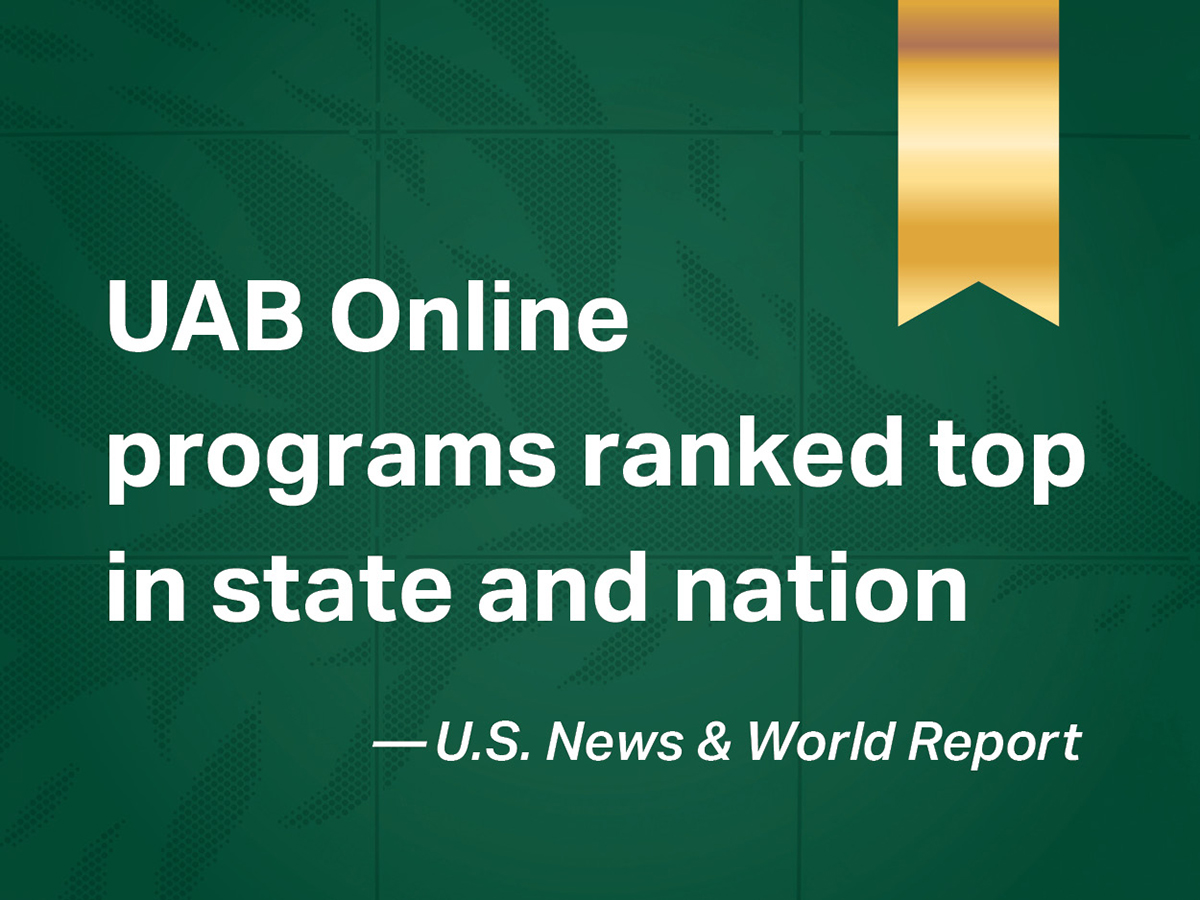 UAB Online leads Alabama in multiple categories in U.S. News Best Online Programs rankingsU.S. News & World Report Best Online Programs gives UAB high marks, including a Top 5 national placement.
UAB Online leads Alabama in multiple categories in U.S. News Best Online Programs rankingsU.S. News & World Report Best Online Programs gives UAB high marks, including a Top 5 national placement. -
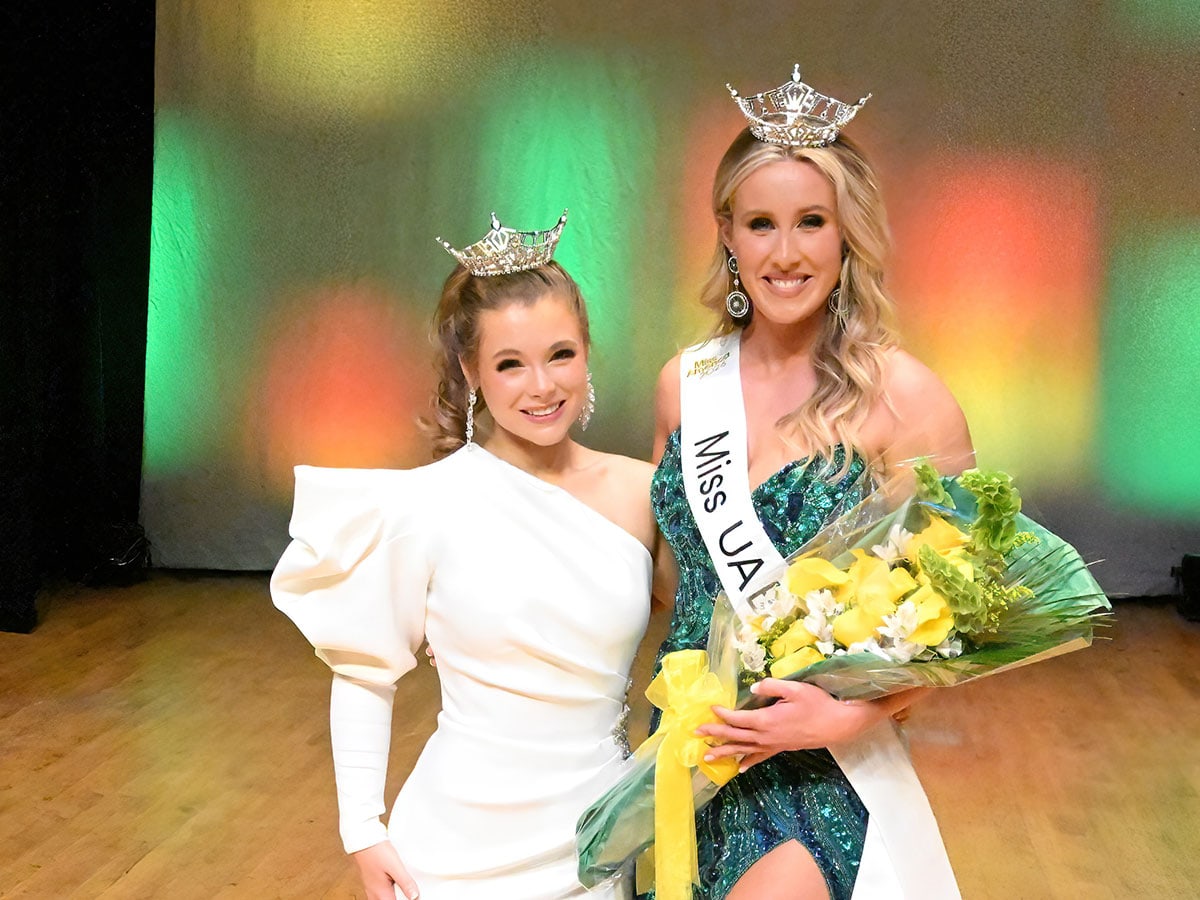 Miss UAB 2026 is Mckinley HubbardHubbard, 20, of Tuscaloosa, Alabama, also won the Miss Congeniality and Talent awards, winning $2,800 in scholarships.
Miss UAB 2026 is Mckinley HubbardHubbard, 20, of Tuscaloosa, Alabama, also won the Miss Congeniality and Talent awards, winning $2,800 in scholarships. -
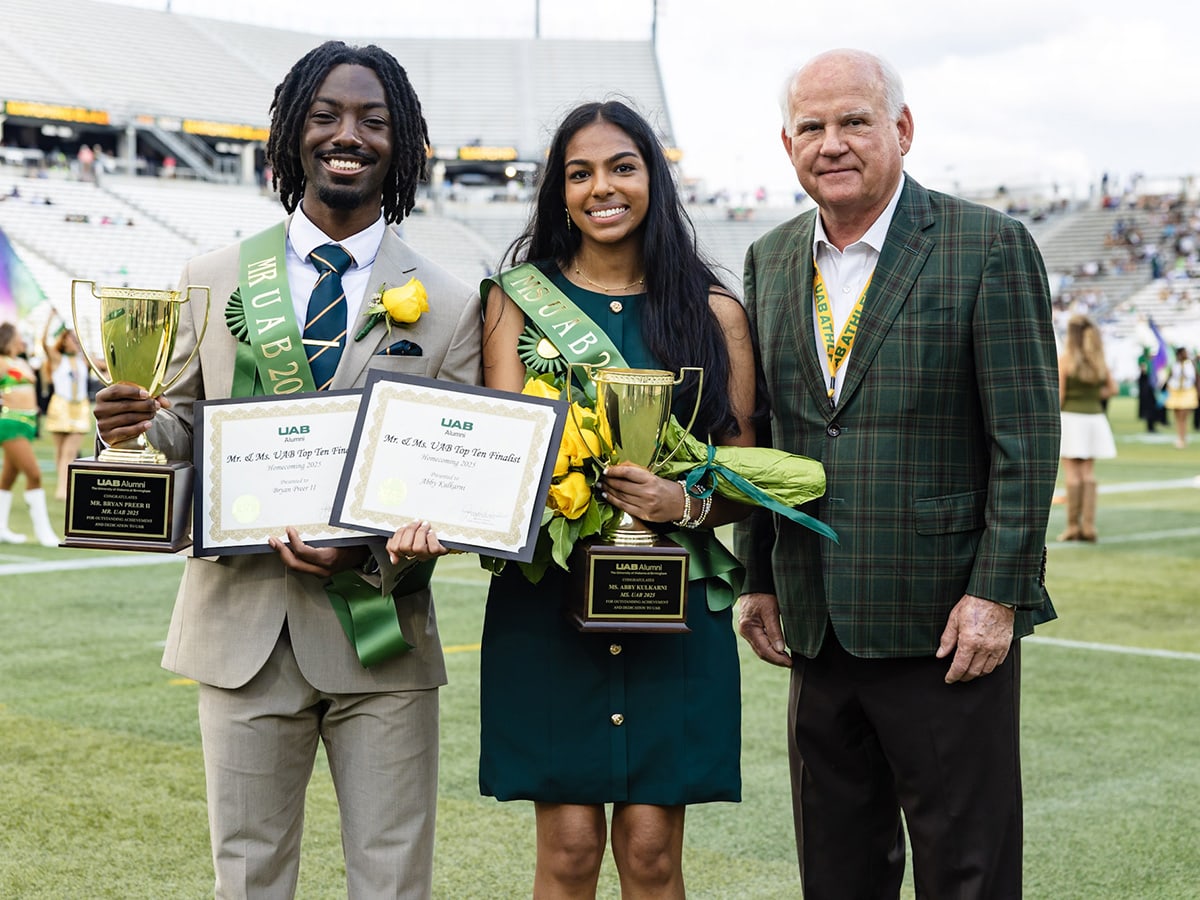 Bryan Preer II and Abby Kulkarni crowned Mr. and Ms. UAB 2026For 45 years, this competition has highlighted UAB students who excel in academics, leadership and community involvement, all while showing true Blazer spirit.
Bryan Preer II and Abby Kulkarni crowned Mr. and Ms. UAB 2026For 45 years, this competition has highlighted UAB students who excel in academics, leadership and community involvement, all while showing true Blazer spirit. -
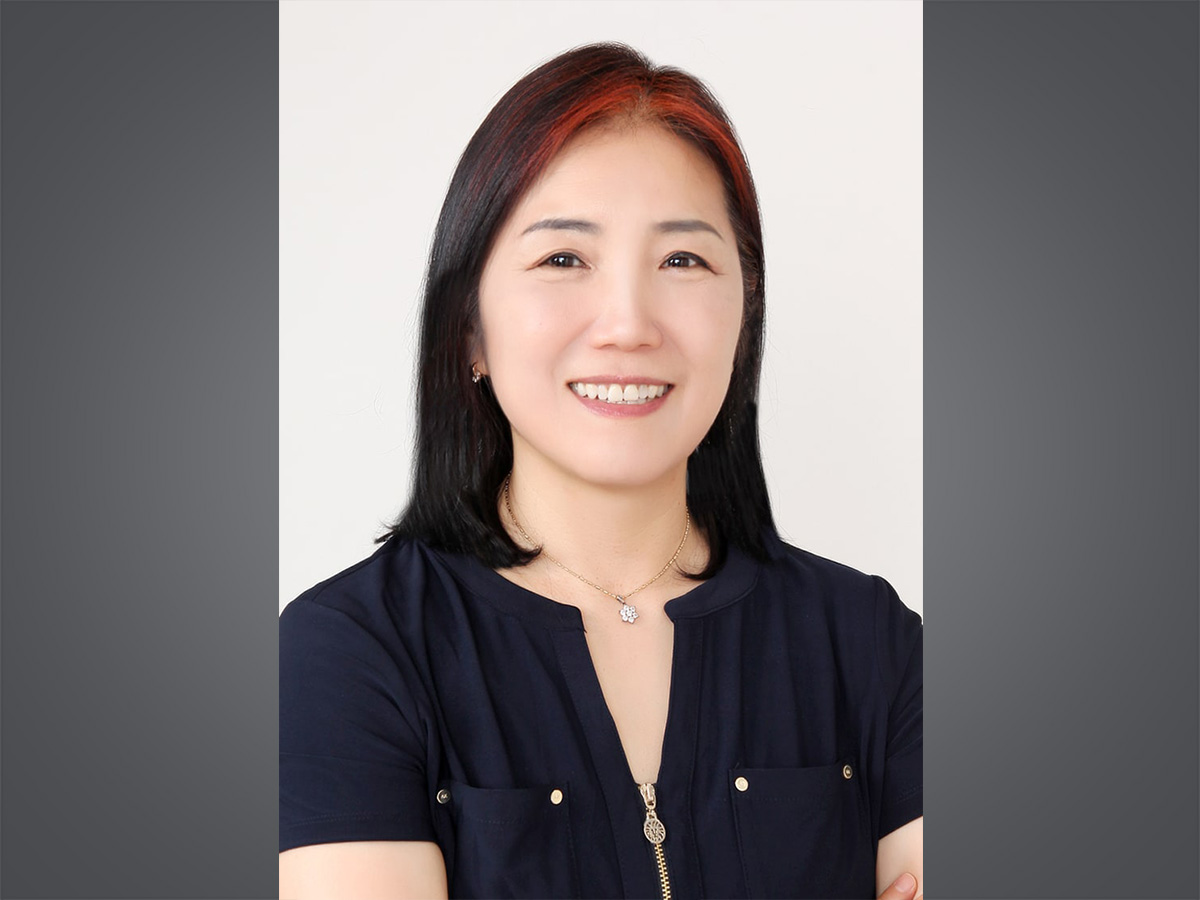 Lim receives award from the Academy of Criminal Justice SciencesHyeyoung Lim was recognized for her mentorship and leadership in the field of crime and prevention.
Lim receives award from the Academy of Criminal Justice SciencesHyeyoung Lim was recognized for her mentorship and leadership in the field of crime and prevention. -
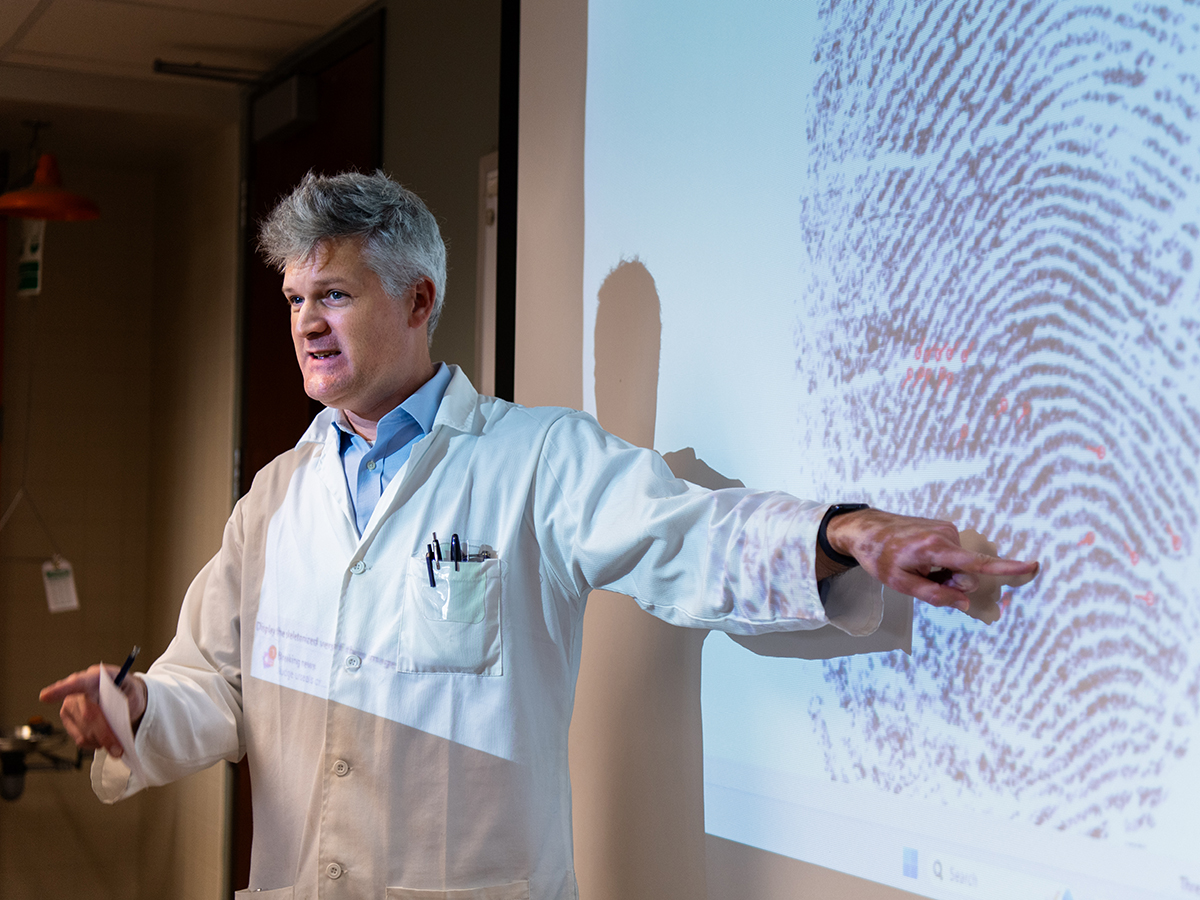 A visual guide to CJ350 - Advanced CriminalisticsFrom blood stains to DNA testing, students in this course learn the real-life workings of a crime lab. Get a glimpse into the class with its instructor, Associate Professor Jason Linville, Ph.D., in this slideshow.
A visual guide to CJ350 - Advanced CriminalisticsFrom blood stains to DNA testing, students in this course learn the real-life workings of a crime lab. Get a glimpse into the class with its instructor, Associate Professor Jason Linville, Ph.D., in this slideshow. -
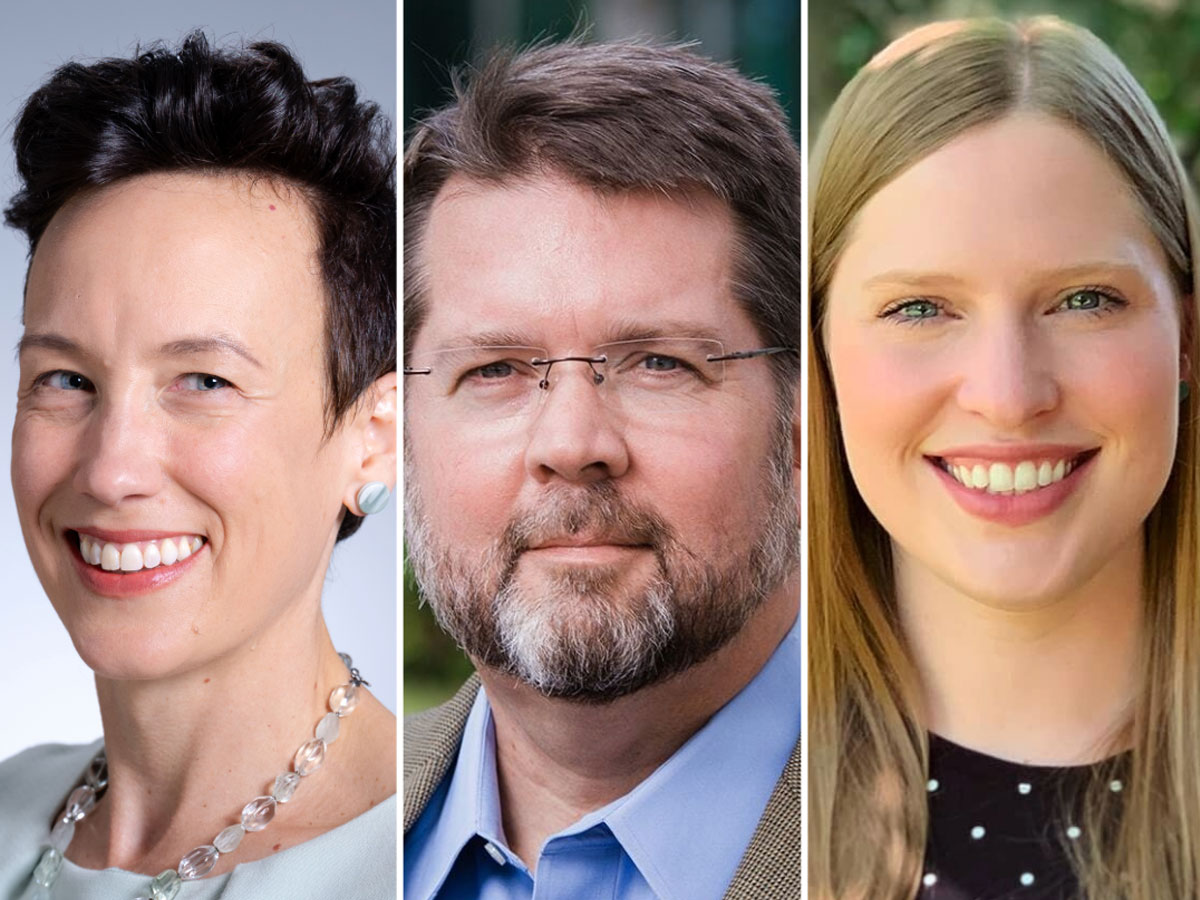 2025 winners of the College of Arts and Sciences Dean's Award for Excellence in TeachingThe Dean’s Award for Excellence in Teaching recognizes full-time, regular faculty members of the University of Alabama at Birmingham’s College of Arts and Sciences (CAS) who have demonstrated exceptional accomplishments in teaching. Award winners must have held faculty status at UAB for a minimum of three years and may receive the award only once in any three-year period.
2025 winners of the College of Arts and Sciences Dean's Award for Excellence in TeachingThe Dean’s Award for Excellence in Teaching recognizes full-time, regular faculty members of the University of Alabama at Birmingham’s College of Arts and Sciences (CAS) who have demonstrated exceptional accomplishments in teaching. Award winners must have held faculty status at UAB for a minimum of three years and may receive the award only once in any three-year period. -
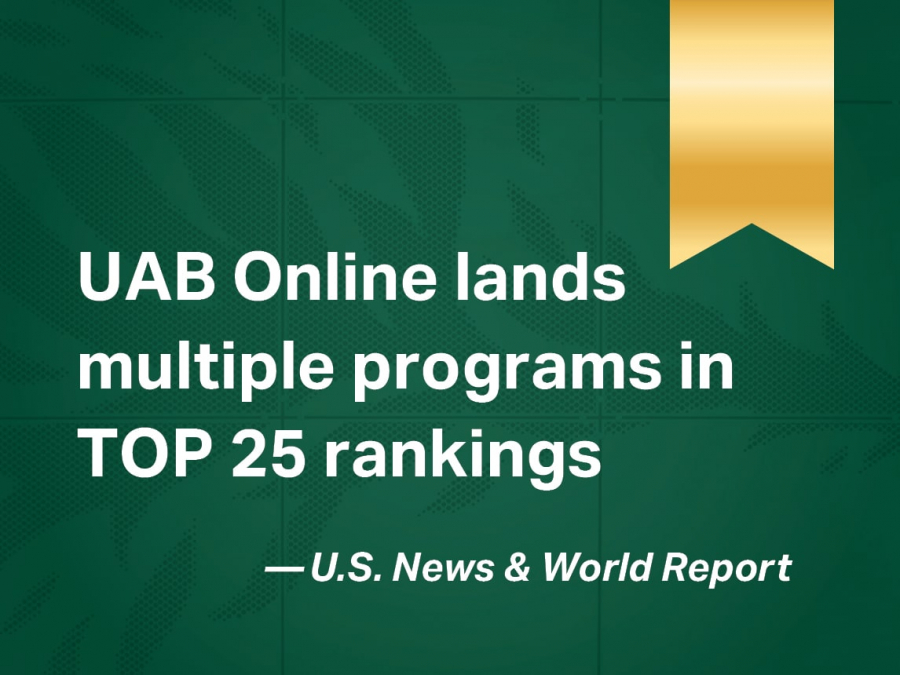 UAB Online lands multiple programs in top 25 rankingsOne of UAB’s online master’s degrees ranked in the top three, marking the highest USNWR ranking for a UAB online program in history.
UAB Online lands multiple programs in top 25 rankingsOne of UAB’s online master’s degrees ranked in the top three, marking the highest USNWR ranking for a UAB online program in history. -
 Buchwalter’s time at UAB has led to a variety of pursuits, from teaching to TikTok“There was just something about her raw curiosity and desire for knowledge that made teaching something I wanted to pursue,” said Buchwalter, who went on to major in history—with a double minor in philosophy and criminal justice—and later earn a master’s in social science education.
Buchwalter’s time at UAB has led to a variety of pursuits, from teaching to TikTok“There was just something about her raw curiosity and desire for knowledge that made teaching something I wanted to pursue,” said Buchwalter, who went on to major in history—with a double minor in philosophy and criminal justice—and later earn a master’s in social science education. -
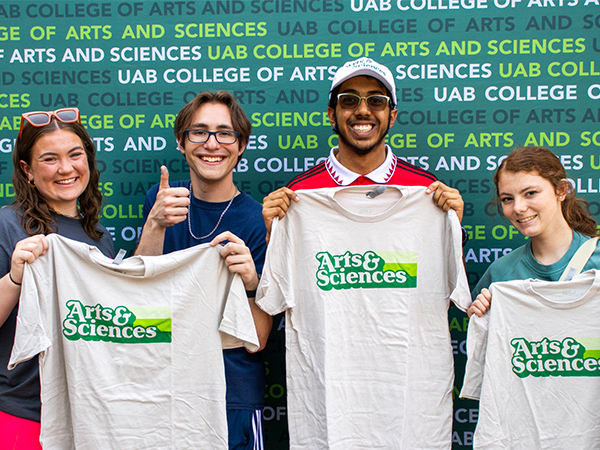 Meet the College of Arts and Sciences USGA SenatorsMeet the student senators representing the College of Arts and Sciences in the Undergraduate Student Government Association (USGA)! Meet the student senators representing the College of Arts and Sciences in the Undergraduate Student Government Association (USGA)!
Meet the College of Arts and Sciences USGA SenatorsMeet the student senators representing the College of Arts and Sciences in the Undergraduate Student Government Association (USGA)! Meet the student senators representing the College of Arts and Sciences in the Undergraduate Student Government Association (USGA)! -
 Twenty CAS faculty members receive promotionsThe College of Arts and Sciences is proud to announce that 20 faculty members across ten departments have been awarded promotions (including one faculty member who also was awarded tenure). The College of Arts and Sciences is proud to announce that 20 faculty members across ten departments have been awarded promotions (including one faculty member who also was awarded tenure).
Twenty CAS faculty members receive promotionsThe College of Arts and Sciences is proud to announce that 20 faculty members across ten departments have been awarded promotions (including one faculty member who also was awarded tenure). The College of Arts and Sciences is proud to announce that 20 faculty members across ten departments have been awarded promotions (including one faculty member who also was awarded tenure). -
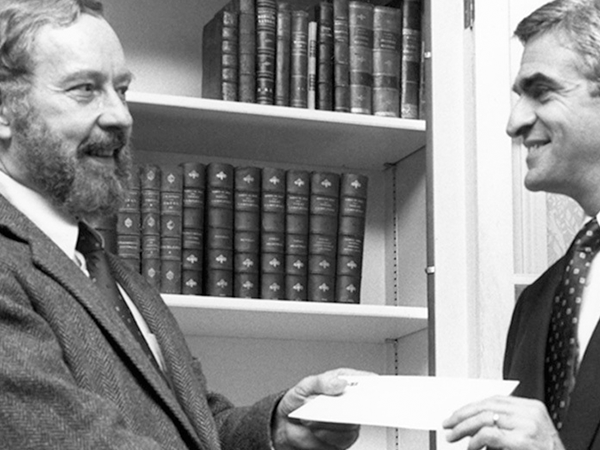 Upcoming interdisciplinary forums to honor the life and legacy of Theodore HaddinThe University of Alabama at Birmingham’s College of Arts and Sciences has selected five presentations for the 2024-2025 Theodore Haddin Interdisciplinary Forum Series (also known as “Haddin Forums”).
Upcoming interdisciplinary forums to honor the life and legacy of Theodore HaddinThe University of Alabama at Birmingham’s College of Arts and Sciences has selected five presentations for the 2024-2025 Theodore Haddin Interdisciplinary Forum Series (also known as “Haddin Forums”). -
 Summer 2024 photo recapThroughout Summer 2024, faculty, staff, and students across the College of Arts and Sciences facilitated camps and on-campus experiences for middle school, high school, and college students. Throughout Summer 2024, faculty, staff, and students across the College of Arts and Sciences facilitated camps and on-campus experiences for middle school, high school, and college students.
Summer 2024 photo recapThroughout Summer 2024, faculty, staff, and students across the College of Arts and Sciences facilitated camps and on-campus experiences for middle school, high school, and college students. Throughout Summer 2024, faculty, staff, and students across the College of Arts and Sciences facilitated camps and on-campus experiences for middle school, high school, and college students. -
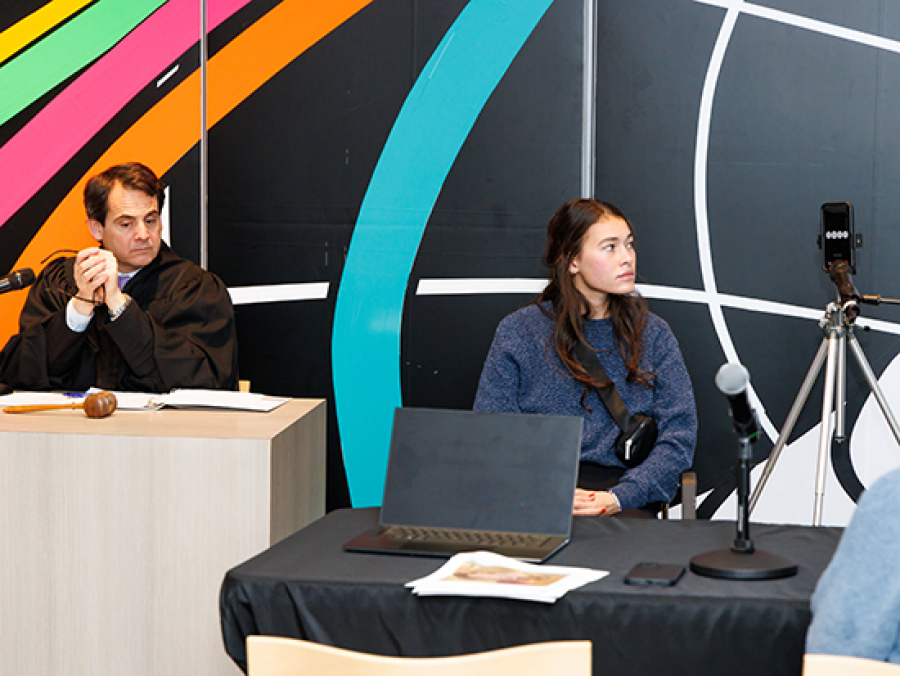 A professor shows future lawyers how to put AI in its placeBrandon Blankenship, J.D., teaching assistant professor and director of the Pre-Law Program in the J. Frank Barefield, Jr.
A professor shows future lawyers how to put AI in its placeBrandon Blankenship, J.D., teaching assistant professor and director of the Pre-Law Program in the J. Frank Barefield, Jr. -
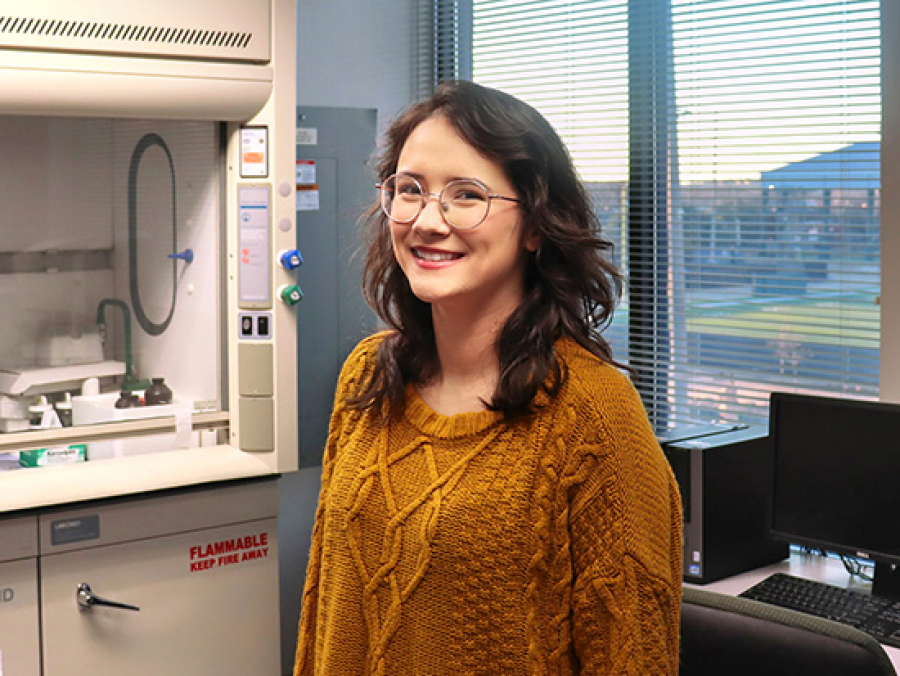 Hendrix finds the right fit with Master’s in Forensic Science programHendrix reflects on her time in the forensic science program, she calls attention to the close-knit community that exists between the students and the faculty.
Hendrix finds the right fit with Master’s in Forensic Science programHendrix reflects on her time in the forensic science program, she calls attention to the close-knit community that exists between the students and the faculty. -
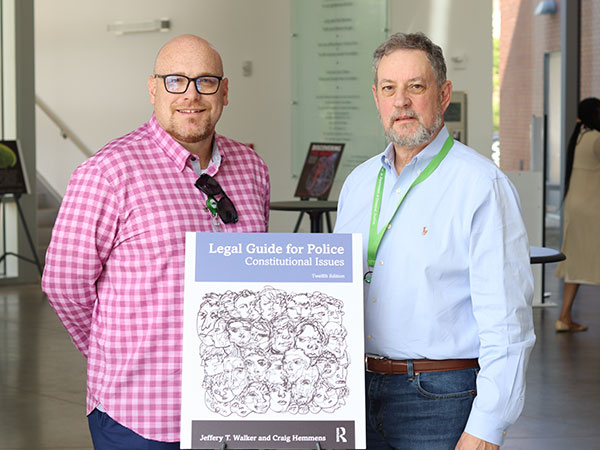 Celebrating CAS Authors: 20 faculty members in the College of Arts and Sciences published books in 2023Twenty faculty members across multiple departments in the University of Alabama at Birmingham’s College of Arts and Sciences wrote or edited 23 books last year. Twenty faculty members across multiple departments in the University of Alabama at Birmingham’s College of Arts and Sciences wrote or edited 23 books last year.
Celebrating CAS Authors: 20 faculty members in the College of Arts and Sciences published books in 2023Twenty faculty members across multiple departments in the University of Alabama at Birmingham’s College of Arts and Sciences wrote or edited 23 books last year. Twenty faculty members across multiple departments in the University of Alabama at Birmingham’s College of Arts and Sciences wrote or edited 23 books last year. -
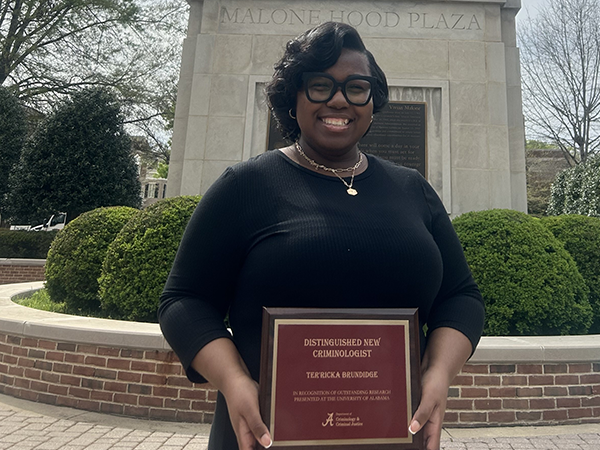 Brundidge reflects on her experience in master’s in criminal justice programTer'Ricka Brundidge, a first year graduate student in the Master of Science in Crimnal Justice program, is recipient of the "Distinguished New Criminologist" award presented by the Department of Criminology and Criminal Justice at the University of Alabama. Hi everyone!
Brundidge reflects on her experience in master’s in criminal justice programTer'Ricka Brundidge, a first year graduate student in the Master of Science in Crimnal Justice program, is recipient of the "Distinguished New Criminologist" award presented by the Department of Criminology and Criminal Justice at the University of Alabama. Hi everyone! -
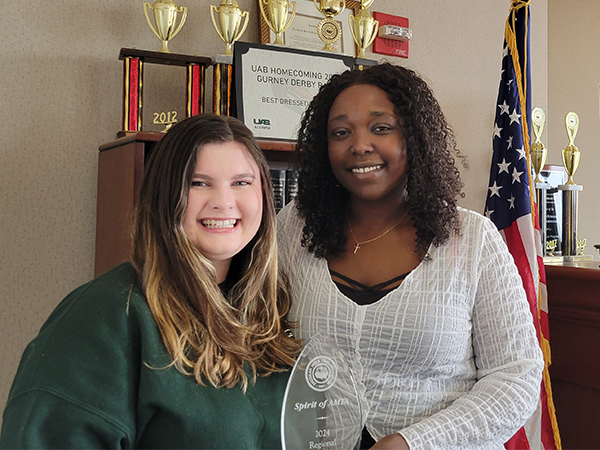 UAB Mock Trial Team wins Spirit of AMTA Award, looks to next year’s tournamentThe UAB Mock Trial team received the American Mock Trial Association (AMTA) Spirit Award. The distinction recognizes the professionalism displayed by the team during a regional competition.
UAB Mock Trial Team wins Spirit of AMTA Award, looks to next year’s tournamentThe UAB Mock Trial team received the American Mock Trial Association (AMTA) Spirit Award. The distinction recognizes the professionalism displayed by the team during a regional competition. -
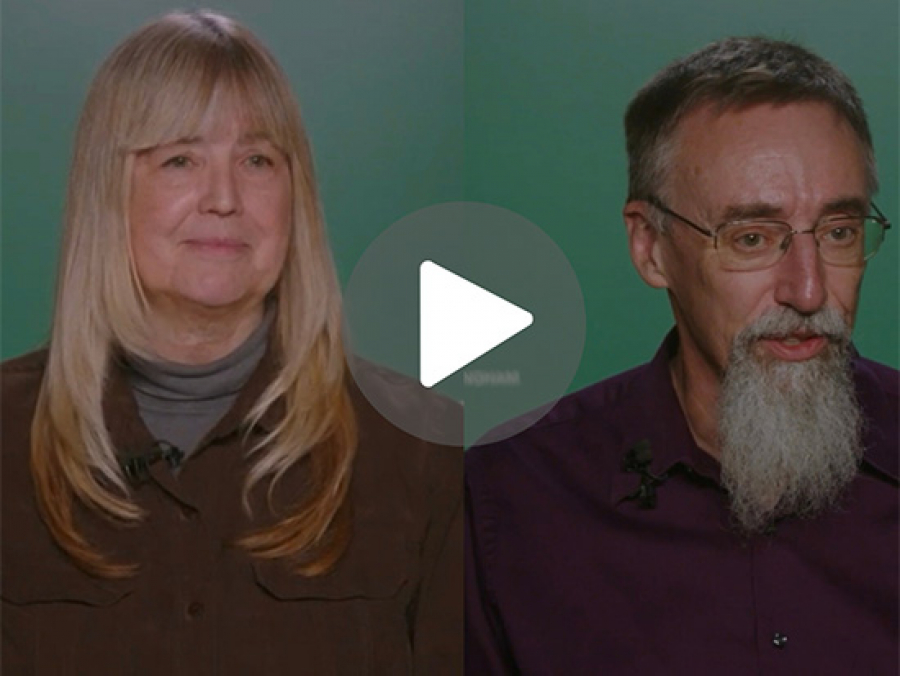 UAB researchers launch ‘20 Targets for Takedown’ to curb cyber crypto scams and opioid salesA partnership between interdisciplinary scientists at UAB will help take down websites involved in illicit drug sales and financial scams.
UAB researchers launch ‘20 Targets for Takedown’ to curb cyber crypto scams and opioid salesA partnership between interdisciplinary scientists at UAB will help take down websites involved in illicit drug sales and financial scams. -
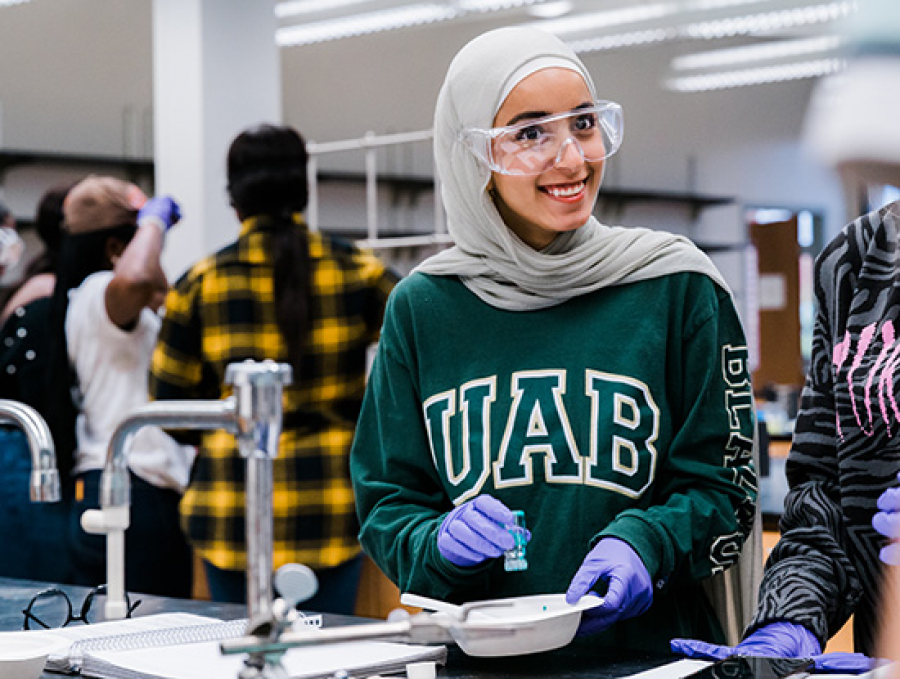 Dive into forensic sciences and uncover the scientist within at UAB Camp CSICamp CSI gives children a chance to explore real-world forensic practices and learn about education and career opportunities in criminal justice.
Dive into forensic sciences and uncover the scientist within at UAB Camp CSICamp CSI gives children a chance to explore real-world forensic practices and learn about education and career opportunities in criminal justice. -
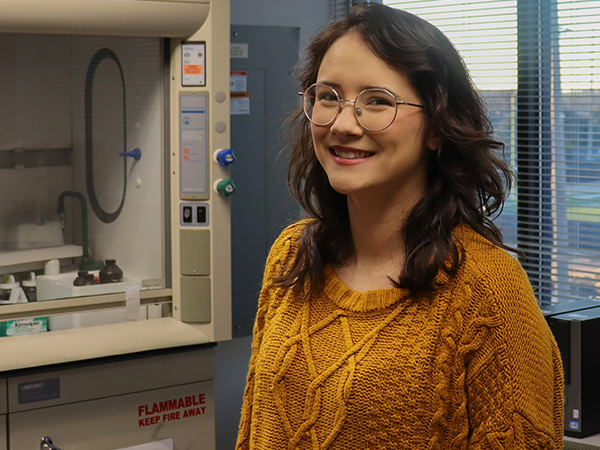 Hendrix finds the right fit with master’s in forensic science programWhen Brynnen Hendrix arrived at the University of Alabama at Birmingham, she knew she wanted to study genetics. When Brynnen Hendrix arrived at the University of Alabama at Birmingham, she knew she wanted to study genetics.
Hendrix finds the right fit with master’s in forensic science programWhen Brynnen Hendrix arrived at the University of Alabama at Birmingham, she knew she wanted to study genetics. When Brynnen Hendrix arrived at the University of Alabama at Birmingham, she knew she wanted to study genetics.